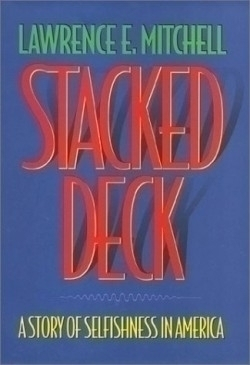Stacked Deck
A Story of Selfishness in America
Lawrence E. Mitchell’s book, Stacked Deck, is the latest title in the Temple University Press series, “America in Transition: Radical Perspectives.” In it, he argues that the typically American values of rugged individualism and self-reliance may lead to behavior that is self-centered and dehumanizing unless corrected by the immediate, intuitive awareness of the essential vulnerability (Mitchell’s key concept) of so many of our fellow human beings.
Mitchell points out that the same social structures that encourage and support the traditional ‘American way of life’ & individual autonomy and responsibility for one’s own decisions and actions, also serve to prevent the most needy among us from enjoying the fruits of that way of life.
It is less than candid, Mitchell argues, to assert that the playing field of enterprise is level for all of us and the opportunities equal when so many of the potential players, for reasons far beyond their personal control, are unable to play the game at all. The deck is stacked against them.
Though Mitchell and his editors have obviously worked hard to translate an essential argument into prose accessible to the general reader, they have not wholly succeeded. Mitchell, a law professor at the George Washington University, devotes too much space refuting the intramural arguments of academic theorists unlikely to be known outside the academy. The most mundane observations are routinely supported by entirely unnecessary footnotes. This book will undoubtedly find its primary readership among academicians and have some difficulty crossing into the mainstream of social commentary.
Reviewed by
Tom Williams
Disclosure: This article is not an endorsement, but a review. The publisher of this book provided free copies of the book to have their book reviewed by a professional reviewer. No fee was paid by the publisher for this review. Foreword Reviews only recommends books that we love. Foreword Magazine, Inc. is disclosing this in accordance with the Federal Trade Commission’s 16 CFR, Part 255.

